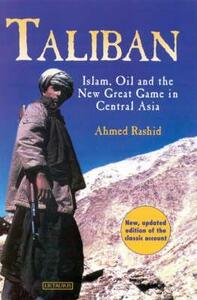Take a photo of a barcode or cover
informative
reflective
An interesting look at one of the mysteries fo what the heck is going on in Afghanistan. The only problem with this book is that it was published in 2000, and doesn't cover anything that has happened in the last 12 years. Great background knowledge.
A great book about a terrible subject. Insightful explanation of what drove the Taliban, in its early years at least, and where it came from. Also loads of info on the part that international politics played in shaping the conditions that gave rise and opportunity to the Taliban. It's quite a complicated web. I'd like to read more by this author.
This is one the most difficult review I've ever tried to write, not because the book itself is vague or inaccessible–on the contrary, its writing is clean, precise and all too understandable. It's just that the subject matter rips across raw nerves. Nevertheless, I wish to draw attention to the book as timely, informative and an evenhanded treatment of the Taliban and the new “great game” of oil and politics in Central Asia.
The text is divided into three main parts, the first dealing with the origins and rise of the Taliban, the next a study of the Taliban's “new-style fundamentalism” compared to more traditional Islam, and the last emphasizing the roles foreign powers–the USSR, Pakistan and the US, later the Central Asian Republics and Iran–have played in increasing the levels of violence and deepening the sectarian and ethnic divisions among Afghans.
The book opens with a harrowing account of a public execution at a soccer stadium in Kandahar, a city in the south of the country and long considered a Taliban stronghold (presumably one reason it received so much punishment during the 2001US-led bombing). It is but one example of Taliban brutality, which Rashid chronicles in plain language, but never unfeelingly. Through Rashid's eyes, the reader sees the glint of sunlight off the condemned man's chains, sees his knees tremble. There is plenty of brutality to chronicle and it comes from all quarters.
Please read the rest of the review here.
The text is divided into three main parts, the first dealing with the origins and rise of the Taliban, the next a study of the Taliban's “new-style fundamentalism” compared to more traditional Islam, and the last emphasizing the roles foreign powers–the USSR, Pakistan and the US, later the Central Asian Republics and Iran–have played in increasing the levels of violence and deepening the sectarian and ethnic divisions among Afghans.
The book opens with a harrowing account of a public execution at a soccer stadium in Kandahar, a city in the south of the country and long considered a Taliban stronghold (presumably one reason it received so much punishment during the 2001US-led bombing). It is but one example of Taliban brutality, which Rashid chronicles in plain language, but never unfeelingly. Through Rashid's eyes, the reader sees the glint of sunlight off the condemned man's chains, sees his knees tremble. There is plenty of brutality to chronicle and it comes from all quarters.
Please read the rest of the review here.
“Those who intervene in Afghanistan can face disintegration themselves — not because of the power of the Afghans, but because of the forces that are unleashed in their own fragile societies”
What a timely quote written 25 years ago. I would love an added chapter or two to this that went from 9/11 to the present.
What a timely quote written 25 years ago. I would love an added chapter or two to this that went from 9/11 to the present.
informative
medium-paced
Very thorough introduction to the Taliban, although somewhat dry in many places. Contains two chapters on oil prospecting in Afghanistan that seemed very long and could have easily been cut down to one chapter.
slow-paced
informative
reflective
slow-paced
This was a very interesting perspective on the Taliban because it was written and published around 2000-early 2001, giving a survey of Central Asian geopolitics that probably hasn't been analyzed in quite the same way since September 11. This book has left me wanting to read more on the history of Pakistan and the ISI, because it introduces so many niche issues, such as the Pakistani trucking cartel and its relationship to the Taliban, or simply the depth of Pakistani involvement in the propping up of the Taliban as a convenient political force in the region. If you learned everything you know about Central Asia after and through the lens of 9/11, this book will really help put the Taliban in a regional and historical context that makes sense. And yet it upends previous assumptions I had, such as just how linear the relationship between the Afghan mujahideen and the Taliban was. Quite a good book, well written and it really helps me trace the origin points for political phenomena in the region that before had me flummoxed.


